What's in a waste expert's rubbish bin?
- Published
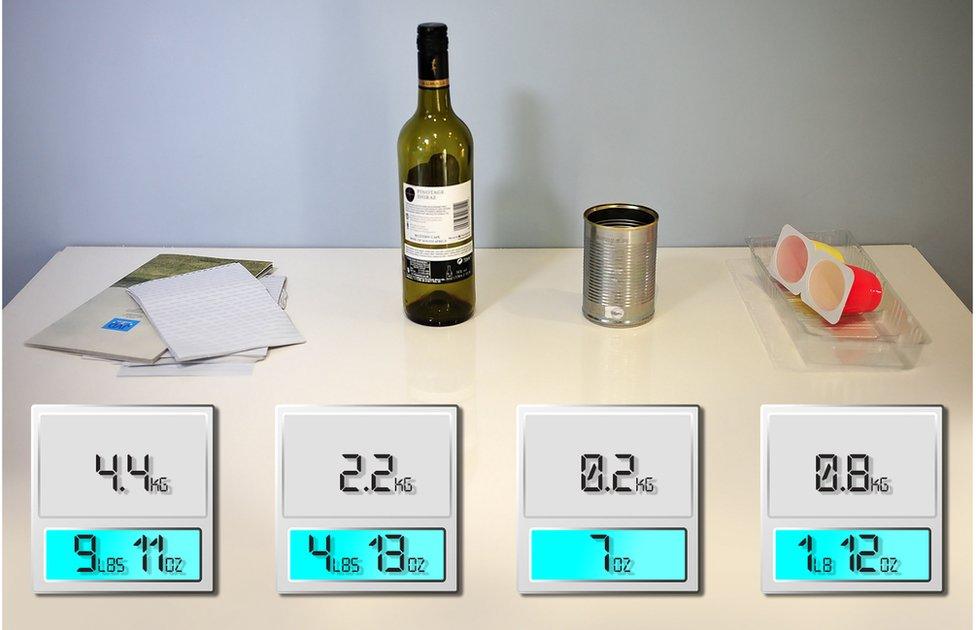
Paper and glass were the heaviest items of dry recycling in Professor Margaret Bates' waste
Paper and card one week, plastics the next - it is easy to be fooled into believing the afterlife of our waste is simple. It is far from it, as the story of one woman's weekly refuse shows.
Margaret Bates, professor of sustainable waste management at the University of Northampton, allowed the BBC go through her rubbish, weigh it out and chart its myriad journeys from the kerb outside her home in East Haddon, Northants.

The black bag and a random sock
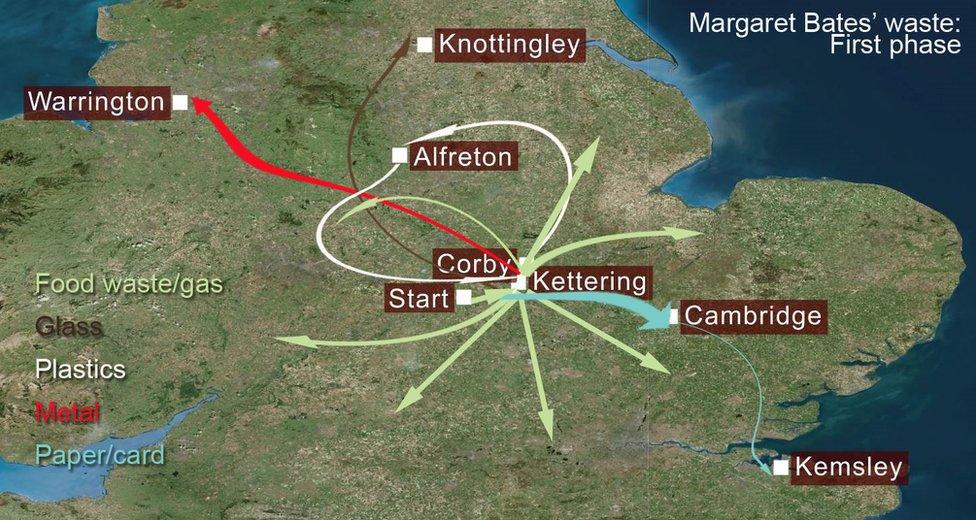
After it is collected, Margaret Bates' waste is sent off to firms which specialise in different types of waste before it is either sold on or turned into new products
Her non-recyclable black bag waste, which contained mainly food wrappers, such as crisp packets, dog food wrappers and an old sock, weighed in at 1.5kg (3lb 4oz).
The contents - described by Prof Bates as "evidence of a very poor diet" - will travel 30 miles (40km) to a landfill site in Cranford, in east Northamptonshire.
As of 1 April however, that journey will be shortened to just 13 miles (21km) when it is turned into a fuel at Malpass Farm in Rugby, for use at a neighbouring cement works.
Defra said England's household waste rose 180,000 tonnes between 2013/2014 and 2014/2015.

Food, glorious food
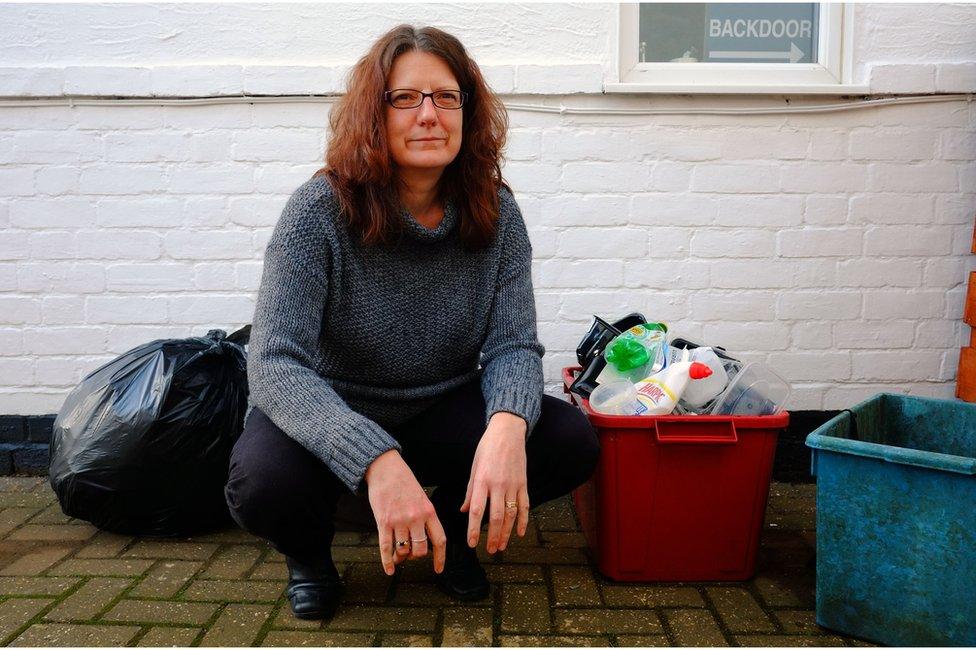
Professor Margaret Bates said going through her own waste with the BBC had made her confront her own buying habits, especially in terms of packaging and wrappers
A brief peek inside Prof Bates' two weighty green bags reveals a mixture of eggs, chopped cabbage and other vegetables.
Hitting the scales at 4kg (8lb 13oz), her food waste is bound for Fernbrook Bio's treatment site 23 miles (37km) away in Kettering.
There it is either composted or turned into biogas which, as well as powering the complex, is also put into the gas network.
According to National Grid, the bio-methane made from her food waste could go anywhere in the UK.

Glass action
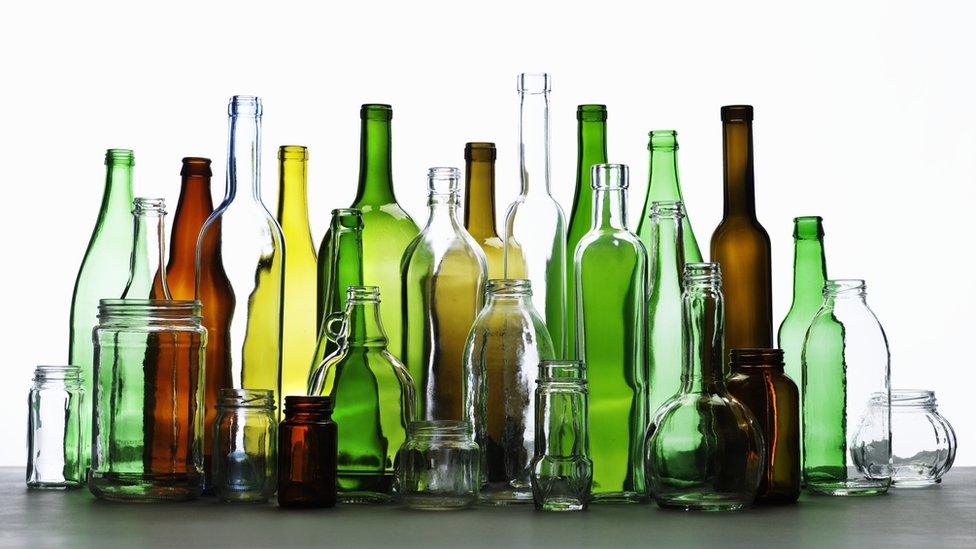
Recycled glass from the UK can end up in wine bottles in places like Italy and France and then shipped out to buyers anywhere in the world
Prof Bates' 2.2kg (4lb 13oz) of glass recycling - all wine and beer bottles - is taken 113 miles (182km) up the M1 to URM (UK) in Knottingley, West Yorkshire, where it is separated and crushed into three main colours: clear, amber and green.
"Our aim is to ensure as much glass as possible is recycled in the UK and turned back into containers," said Lee Glover, quality manager at URM (UK).
"Many of the containers produced in the UK will be used within the UK but can also be shipped anywhere in the world."
As well as supplying glass manufacturers across the UK, URM (UK) cullet also supplies firms across Europe including Spain, The Netherlands and France.
And if URM (UK) finds errant material in Bates' glass waste, her recycling efforts could end up beneath our feet as glass aggregate in paving blocks.

Plastic fantastic
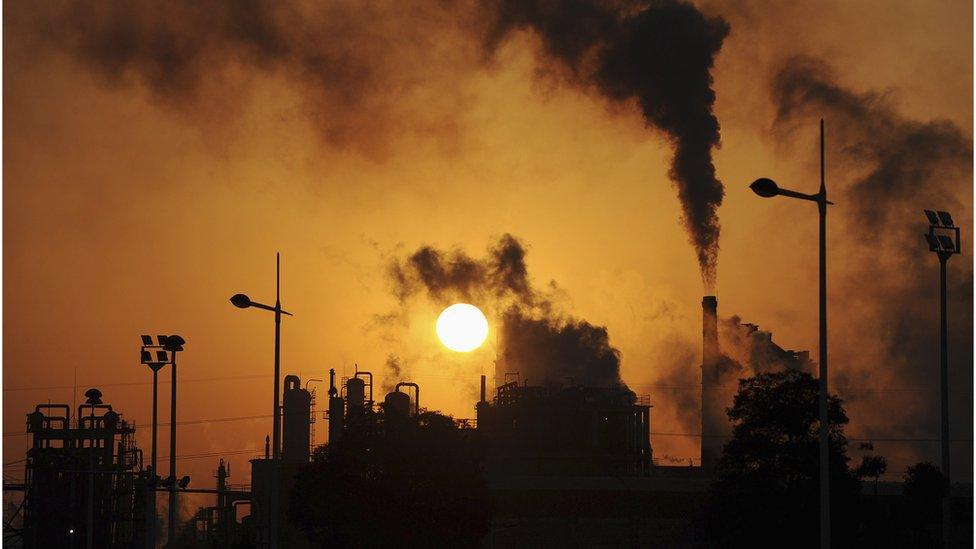
China remains one of the largest buyers of recycled plastic from the UK
Prof Bates' 1lb 12oz (800g) of plastic waste (and her aluminium cans) is sent to plastic recycler Jayplas 66 miles (106km) away in Alfreton, Derbyshire. There it is sorted by type.
"With plastics," says Prof Bates, "they could end up absolutely anywhere and turned into virtually anything.
"It could go into clothing, food packaging or it could end up being turned into street furniture, such as bollards or benches."
Mike Maxwell, operations director at Jayplas, said the bulk of the plastics he dealt with went to UK and European markets with some types going to China.
Soft drinks and water bottles, he said, were sent 84 miles (135km) to a special plant in Corby for cleaning before being turned into vegetable trays, new bottles and food-grade packaging across the UK.
The rest of the plastic cast offs, he said, would most likely end up either in the UK or in Europe, having been turned into anything from nappies to plant pots.
"Everything gets traded on an international level," says Prof Bates. "So you might get a tonne of plastics coming from Northamptonshire mixed with a tonne of plastics coming from the Netherlands and ending up in China being converted into some kind of plastic bag or box or any other kind of plastic good.
Such a journey from Daventry to China is a 5,800-mile (9,334km) trip. Or double that if the goods made from the plastics return to the UK.

Metals
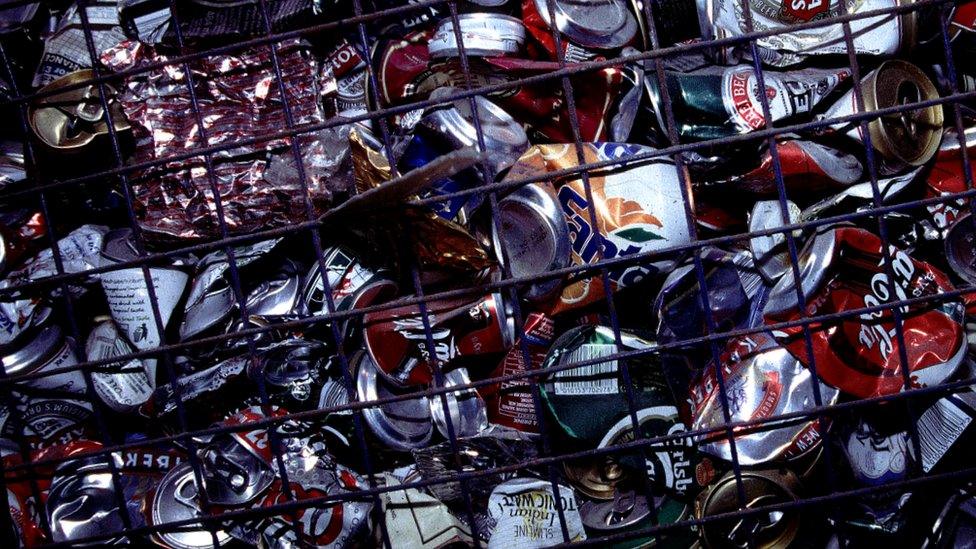
The price of metals varies considerably depending on type of metal items contain
One week steel cans will fetch £75 per tonne, two weeks later they will fetch up to £90. Aluminium cans are worth about 10 times as much.
Jayplas sells Prof Bates' used aluminium cans to Novelis, a US-based company which is part of the multinational Aditya Birla Group, based in Mumbai, India.
A spokesman for the company said it recycled aluminium products at a number of sites including its plant in Nachterstedt in Germany and turned them into "high value aluminium ingots to feed our European manufacturing network".

Paper and card
As for Prof Bates' card and paper waste, it will be squeezed into bales and taken first to DS Smith's Cambridge depot and then on to Kemsley, a total trip of 165 miles (264km).
Joy Brown, of DS Smith, said: "Within two weeks, her waste paper could be back on the shelves as new packaging material."
So her recycling will not only travel the globe but will do so again and again, as it is further recycled and reincarnated by other people, in other places, into other things.

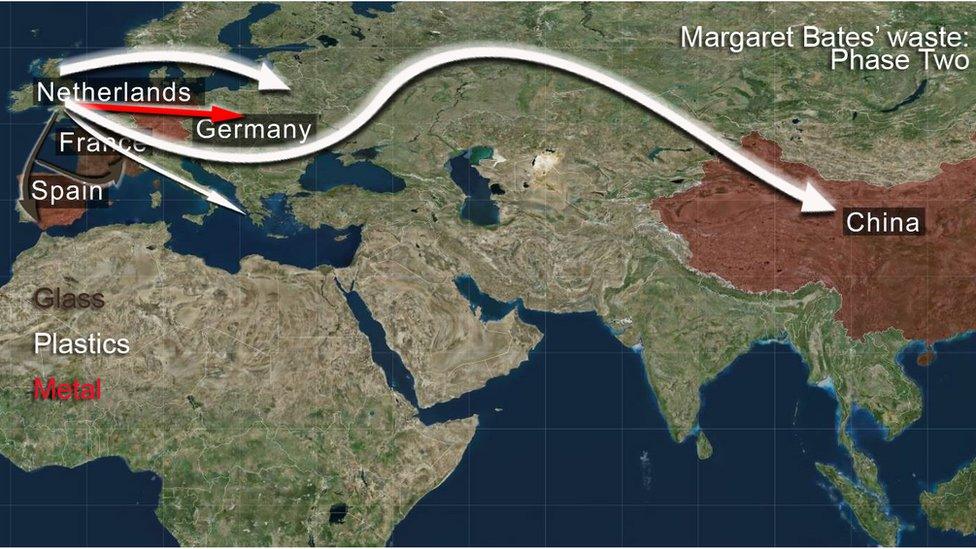
Some of the recycled products will be sent beyond the UK. Much of the UK's plastic ends up in China which uses it in manufacturing. Some of these products are then sold to the UK
What does Prof Bates make of all this?
"Having looked at my waste and what I have just put out - probably more carefully than I have ever looked at my own waste before - I think I will be much more aware of the level of packaging I buy and try and buy things loosely such as vegetables and fruit.
"But ideally what we would like is to have the reprocessing infrastructure all in the UK, because then it means we are keeping the value of our materials rather than having to send it off only to then buy it back from those countries."
A Defra spokesman said: "Waste going to landfill fell by 20 per cent in 2014-2015 and the total amount of all waste recycled was up by 1.3%. This reflects hard work by local authorities and a desire from people to recycle more."
Inside Out East will look at why people are producing more and more rubbish despite the recycling effort on Monday at 19:30 GMT on BBC One.